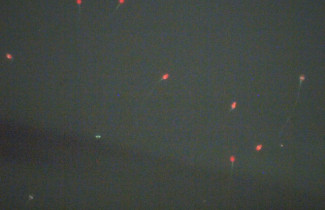The doctoral dissertation in the field of Biology will be examined at the Faculty of Science, Forestry and Technology, Joensuu Campus and online.
What is the topic of your doctoral research? Why is it important to study the topic?
My topic relates to human infertility and provides new insights into sperm function in different microenvironments. An increasing number of people are affected by infertility. According to the World Health Organization, one out of six people globally suffers from this condition in their lifetime. Importantly, up to 40% of couples affected by infertility cannot be diagnosed based on current knowledge, making it impossible to select a treatment strategy in an optimal and personalized manner. To facilitate the development of more efficient diagnostics and treatment technologies, researchers are exploring new avenues in basic research to enhance the understanding of how sperm function is regulated.
What are the key findings or observations of your doctoral research?
This thesis widens our understanding of the effects of three body fluids on sperm function. The results of the first study showed that the impact of seminal plasma on sperm curvilinear swimming velocity, the proportion of hyperactivated sperm, and sperm viability depended on the sperm donor, seminal plasma donor, and their interaction. Furthermore, a positive association was observed between the abundance of proteins found in seminal plasma, specifically DPP4 and NEP, and sperm curvilinear swimming velocity and the proportion of hyperactivated sperm. The results of the second study demonstrated that sperm responses to follicular fluid (the fluid surrounding an oocyte) induced functional and transcriptome-level changes in sperm. The observed changes in sperm transcriptome were potentially driven by both genomic factors (the use of nucleosomal chromatin as a platform for de novo transcription) and nongenomic mechanisms. Such de novo transcription-mediated transcriptome-level changes in sperm in response to external stimuli are widely thought to be non-existent and have not been previously investigated. Finally, the results of the third study showed that sperm responses to follicular fluid and serum of the same female were comparable in 70% of cases, indicating that serum could be used as a surrogate for follicular fluid to evaluate sperm response.
How can the results of your doctoral research be utilised in practice?
This thesis opens up new research avenues and experimentally demonstrates, for the first time, that in addition to changes in sperm swimming behavior, follicular fluid also affects sperm transcriptome. The thesis suggests two candidate molecules present in seminal plasma for further evaluation of their potential to improve sperm function, enabling the use of less invasive infertility treatment options. Observed transcriptome-level results begin to elucidate why nucleosomal chromatin is retained in mature sperm. Future studies are necessary to understand the biological meaning of the modulation of sperm transcriptome by follicular fluid and whether the similar observation in sperm function in response to serum and follicular fluid of the same female could be of clinical significance and pave the way for the development of compatibility diagnostics of the reproductive partners.
What are the key research methods and materials used in your doctoral research?
This thesis is part of a larger research project, which the Academy of Finland has granted to Professor Jukka Kekäläinen. In this thesis, sperm performance in different body fluids was measured using computer-aided sperm analysis using a full factorial experimental design. Sperm responses to seminal plasma from different males, as well as follicular fluid and serum from different females, were investigated in all possible male-male or male-female combinations. Furthermore, next-generation sequencing methods were used to analyze how RNA content in sperm is affected by exposure to follicular fluid.
Is there something else about your doctoral dissertation you would like to share in the press release?
This thesis was financially supported, in addition to the Academy of Finland, by personal grants awarded by the Yrjö Jahnsson and Oskar Öflund foundations. I am very grateful to all the participants who have donated study samples and enabled this work. This thesis was carried out in collaboration with the North Karelia Central Hospital, InOva Clinic (nowadays Ovumia Kuopio), the Finnish Red Cross Blood Service, and the research group led by Stephen A. Krawetz at Wayne State University, USA.
The doctoral dissertation of Tanja Turunen, MSc, entitled Insights into the sperm function in different microenvironments on its journey to the oocyte will be examined at the Faculty of Science, Forestry and Technology, Joensuu Campus. The opponent will be Professor Andres Salumets, Karolinska Institutet, and the custos will be Professor Jukka Kekäläinen University of Eastern Finland. Language of the public defence is English.
For more information, please contact:
Tanja Turunen, tanja.turunen@uef.fi, tel. +358 45 112 9683






